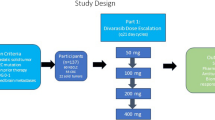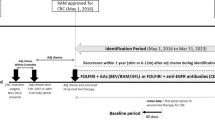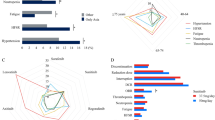Abstract
Purpose
In recent years, anti-angiogenesis drugs have shown promising clinical effects against many tumors, particularly in combination with chemotherapy. Although the combination has become a standard of care for many tumors, the mechanisms of the chemosensitizing activity of anti-angiogenic drugs are not fully understood. Here, we sought to determine if anti-angiogenesis drug bevacizumab could enhance the chemosensitivity of HCC by inhibition of survivin.
Methods
After treatment of human umbilical vein endothelial cells (HUVECs) and hepatocellular carcinoma (HCC) cell line PLC/PRF/5 (PLC) with bevacizumab or/and adriamycin, the direct effects were examined by survival assays, and the expression of Akt, Phospho-Akt and survivin were evaluated by western blot. Tumor growth was observed in a human HCC xenograft nude mouse model treated with different drugs, and the expression of PCNA, CD31 and survivin in tumor tissues were evaluated by means of immunohistochemistry.
Results
Bevacizumab enhanced the chemosensitivity of HCC by inhibiting the VEGF-PI3 K/Akt-survivin signaling cascade in endothelial cells. The combination of bevacizumab with adriamycin therapy resulted in better outcomes compared with monotherapy in hepatocellular carcinoma xenografts; bevacizumab significantly inhibited tumor angiogenesis and growth. In addition, bevacizumab reduced survivin expression in tumor tissues, including tumor vascular endothelial cells in vivo, although it did not inhibit survivin expression in tumor cells in vitro.
Conclusion
These results implicate the bevacizumab-increased efficacy of adriamycin via an inhibition of survivin expression in malignant cells as well as tumor vasculature cells, which provides other insights into the mechanism of enhanced efficacy by combination of VEGF blocker and chemotherapeutic agents.




Similar content being viewed by others
References
Altieri DC (2008) Survivin, cancer networks and pathway-directed drug discovery. Nat Rev Cancer 8:61–70
Altznauer F, Martinelli S, Yousefi S, Thurig C, Schmid I, Conway EM, Schoni MH, Vogt P, Mueller C, Fey MF, Zangemeister-Wittke U, Simon HU (2004) Inflammation-associated cell cycle-independent block of apoptosis by survivin in terminally differentiated neutrophils. J Exp Med 199:1343–1354
Bergers G, Benjamin LE (2003) Tumorigenesis and the angiogenic switch. Nat Rev Cancer 3:401–410
Blanc-Brude OP, Mesri M, Wall NR, Plescia J, Dohi T, Altieri DC (2003) Therapeutic targeting of the survivin pathway in cancer: initiation of mitochondrial apoptosis and suppression of tumor-associated angiogenesis. Clin Cancer Res 9:2683–2692
Bruix J, Llovet JM (2002) Prognostic prediction and treatment strategy in hepatocellular carcinoma. Hepatology 35:519–524
Caldas H, Fangusaro JR, Boue DR, Holloway MP, Altura RA (2007) Dissecting the role of endothelial SURVIVIN DeltaEx3 in angiogenesis. Blood 109:1479–1489
Cosgrave N, Hill AD, Young LS (2006) Growth factor-dependent regulation of survivin by c-myc in human breast cancer. J Mol Endocrinol 37:377–390
Ferrara N (2005) The role of VEGF in the regulation of physiological and pathological angiogenesis. EXS 94:209–231
Fields AC, Cotsonis G, Sexton D, Santoianni R, Cohen C (2004) Survivin expression in hepatocellular carcinoma: correlation with proliferation, prognostic parameters, and outcome. Mod Pathol 17:1378–1385
Finn RS, Zhu AX (2009) Targeting angiogenesis in hepatocellular carcinoma: focus on VEGF and bevacizumab. Expert Rev Anticancer Ther 9:503–509
Folkins C, Man S, Xu P, Shaked Y, Hicklin DJ, Kerbel RS (2007) Anticancer therapies combining antiangiogenic and tumor cell cytotoxic effects reduce the tumor stem-like cell fraction in glioma xenograft tumors. Cancer Res 67:3560–3564
Hurwitz H, Fehrenbacher L, Novotny W, Cartwright T, Hainsworth J, Heim W, Berlin J, Baron A, Griffing S, Holmgren E, Ferrara N, Fyfe G, Rogers B, Ross R, Kabbinavar F (2004) Bevacizumab plus irinotecan, fluorouracil, and leucovorin for metastatic colorectal cancer. N Engl J Med 350:2335–2342
Ito T, Shiraki K, Sugimoto K, Yamanaka T, Fujikawa K, Ito M, Takase K, Moriyama M, Kawano H, Hayashida M, Nakano T, Suzuki A (2000) Survivin promotes cell proliferation in human hepatocellular carcinoma. Hepatology 31:1080–1085
Jain RK (2005) Normalization of tumor vasculature: an emerging concept in antiangiogenic therapy. Science 307:58–62
Kawasaki H, Toyoda M, Shinohara H, Okuda J, Watanabe I, Yamamoto T, Tanaka K, Tenjo T, Tanigawa N (2001) Expression of survivin correlates with apoptosis, proliferation, and angiogenesis during human colorectal tumorigenesis. Cancer 91:2026–2032
Kerbel RS (2006) Antiangiogenic therapy: a universal chemosensitization strategy for cancer? Science 312:1171–1175
Le Gouill S, Podar K, Amiot M, Hideshima T, Chauhan D, Ishitsuka K, Kumar S, Raje N, Richardson PG, Harousseau JL, Anderson KC (2004) VEGF induces Mcl-1 up-regulation and protects multiple myeloma cells against apoptosis. Blood 104:2886–2892
Li F, Ling X (2006) Survivin study: an update of “what is the next wave”? J Cell Physiol 208:476–486
Marusawa H, Matsuzawa S, Welsh K, Zou H, Armstrong R, Tamm I, Reed JC (2003) HBXIP functions as a cofactor of survivin in apoptosis suppression. EMBO J 22:2729–2740
Mesri M, Morales-Ruiz M, Ackermann EJ, Bennett CF, Pober JS, Sessa WC, Altieri DC (2001) Suppression of vascular endothelial growth factor-mediated endothelial cell protection by survivin targeting. Am J Pathol 158:1757–1765
Miller K, Wang M, Gralow J, Dickler M, Cobleigh M, Perez EA, Shenkier T, Cella D, Davidson NE (2007) Paclitaxel plus bevacizumab versus paclitaxel alone for metastatic breast cancer. N Engl J Med 357:2666–2676
Moriai R, Tsuji N, Moriai M, Kobayashi D, Watanabe N (2008) Survivin plays as a resistant factor against tamoxifen-induced apoptosis in human breast cancer cells. Breast Cancer Res Treat 117:261–271
Nakagawa Y, Abe S, Kurata M, Hasegawa M, Yamamoto K, Inoue M, Takemura T, Suzuki K, Kitagawa M (2006) IAP family protein expression correlates with poor outcome of multiple myeloma patients in association with chemotherapy-induced overexpression of multidrug resistance genes. Am J Hematol 81:824–831
O’Connor DS, Schechner JS, Adida C, Mesri M, Rothermel AL, Li F, Nath AK, Pober JS, Altieri DC (2000) Control of apoptosis during angiogenesis by survivin expression in endothelial cells. Am J Pathol 156:393–398
Podar K, Tonon G, Sattler M, Tai YT, Legouill S, Yasui H, Ishitsuka K, Kumar S, Kumar R, Pandite LN, Hideshima T, Chauhan D, Anderson KC (2006) The small-molecule VEGF receptor inhibitor pazopanib (GW786034B) targets both tumor and endothelial cells in multiple myeloma. Proc Natl Acad Sci USA 103:19478–19483
Riedel F, Gotte K, Goessler U, Sadick H, Hormann K (2004) Targeting chemotherapy-induced VEGF up-regulation by VEGF antisense oligonucleotides in HNSCC cell lines. Anticancer Res 24:2179–2183
Sakurai T, Maeda S, Chang L, Karin M (2006) Loss of hepatic NF-kappa B activity enhances chemical hepatocarcinogenesis through sustained c-Jun N-terminal kinase 1 activation. Proc Natl Acad Sci U S A 103:10544–10551
Shaked Y, Bertolini F, Man S, Rogers MS, Cervi D, Foutz T, Rawn K, Voskas D, Dumont DJ, Ben-David Y, Lawler J, Henkin J, Huber J, Hicklin DJ, D’Amato RJ, Kerbel RS (2005) Genetic heterogeneity of the vasculogenic phenotype parallels angiogenesis; Implications for cellular surrogate marker analysis of antiangiogenesis. Cancer Cell 7:101–111
Singh RP, Dhanalakshmi S, Agarwal C, Agarwal R (2005) Silibinin strongly inhibits growth and survival of human endothelial cells via cell cycle arrest and downregulation of survivin, Akt and NF-kappaB: implications for angioprevention and antiangiogenic therapy. Oncogene 24:1188–1202
Tran J, Master Z, Yu JL, Rak J, Dumont DJ, Kerbel RS (2002) A role for survivin in chemoresistance of endothelial cells mediated by VEGF. Proc Natl Acad Sci U S A 99:4349–4354
Tu SP, Cui JT, Liston P, Xiao HJ, Xu R, Lin MC, Zhu YB, Zou B, Ng SS, Jiang SH, Xia HH, Wong WM, Chan AO, Yuen MF, Lam SK, Kung HF, Wong BC (2005) Gene therapy for colon cancer by adeno-associated viral vector-mediated transfer of survivin Cys84Ala mutant. Gastroenterology 128:361–375
Virrey JJ, Guan S, Li W, Schonthal AH, Chen TC, Hofman FM (2008) Increased survivin expression confers chemoresistance to tumor-associated endothelial cells. Am J Pathol 173:575–585
Xiang R, Mizutani N, Luo Y, Chiodoni C, Zhou H, Mizutani M, Ba Y, Becker JC, Reisfeld RA (2005) A DNA vaccine targeting survivin combines apoptosis with suppression of angiogenesis in lung tumor eradication. Cancer Res 65:553–561
Xin H, Zhang C, Herrmann A, Du Y, Figlin R, Yu H (2009) Sunitinib inhibition of Stat3 induces renal cell carcinoma tumor cell apoptosis and reduces immunosuppressive cells. Cancer Res 69:2506–2513
Yamamoto H, Ngan CY, Monden M (2008) Cancer cells survive with survivin. Cancer Sci 99:1709–1714
Yang L, Cao Z, Li F, Post DE, Van Meir EG, Zhong H, Wood WC (2004) Tumor-specific gene expression using the survivin promoter is further increased by hypoxia. Gene Ther 11:1215–1223
Zaffaroni N, Daidone MG (2002) Survivin expression and resistance to anticancer treatments: perspectives for new therapeutic interventions. Drug Resist Updat 5:65–72
Zaffaroni N, Pennati M, Daidone MG (2005) Survivin as a target for new anticancer interventions. J Cell Mol Med 9:360–372
Zhu AX, Blaszkowsky LS, Ryan DP, Clark JW, Muzikansky A, Horgan K, Sheehan S, Hale KE, Enzinger PC, Bhargava P, Stuart K (2006) Phase II study of gemcitabine and oxaliplatin in combination with bevacizumab in patients with advanced hepatocellular carcinoma. J Clin Oncol 24:1898–1903
Acknowledgments
This work was supported by National Natural Science Foundation of China (30731160005, 30872504), China National “211” Project for Higher Education, and National Key Science and Technology Specific Project (2008ZX10002-019, 021).
Conflict of interest statement
None.
Author information
Authors and Affiliations
Corresponding author
Additional information
Y.-Q. Xiong and H.-C. Sun contributed equally to this work.
Rights and permissions
About this article
Cite this article
Xiong, YQ., Sun, HC., Zhu, XD. et al. Bevacizumab enhances chemosensitivity of hepatocellular carcinoma to adriamycin related to inhibition of survivin expression. J Cancer Res Clin Oncol 137, 505–512 (2011). https://doi.org/10.1007/s00432-010-0914-8
Received:
Accepted:
Published:
Issue Date:
DOI: https://doi.org/10.1007/s00432-010-0914-8




